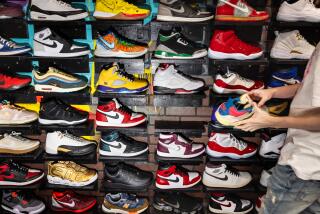Slide Shoes Hit the Ground Running
- Share via
Elvis Castaneda leaps onto a concrete block and eyes a metal post propped against it. “Jump on it, dude,” says a boy who is watching.
Elvis, 10, needs no prompting. Instantly, the Cypress boy’s feet hit the pole and he slides to the pavement--”grinding” in the language of skateboarders and in-line skaters.
But instead of wheels, Elvis does his tricks with Soaps, sneakers with a smooth plastic plate in the arch that permits grinding along curbs or handrails. These are shoes with an attitude and a price tag to match, selling for $70 to $110 a pair.
Although most adults haven’t heard of them, Soap shoes are blowing up (skateboarder lingo for taking off) with retailers and young consumers, some of whom use them as stealth skates in areas where skateboarding and in-line skates are banned.
For the company that makes Soaps, Torrance-based Artemis Innovation Inc., the sliding shoes have become a windfall. The privately held company expects sales in only its second full year of business to double to an estimated $15 million. That growth contrasts sharply with the rest of the $7.5-billion athletic-footwear industry, which last year saw its sales slip for the first time in six years.
For now, Soaps stand at the crossroads of fun and fashion. Whether they glide forward to become the next big thing or slam (translation: fall hard) remains to be seen. But the story of their creation and launch provides a glimpse into a high-stakes world of trend-shaping and entrepreneurial energy aimed at one of America’s most lucrative markets, the $100-billion teen market.
It hasn’t hurt that the shoes promise a bit of risk. Some schools have moved to ban them for safety reasons--a godsend for a company with a product aimed at today’s edgy youth.
“The rebellious little touch is exactly what was needed to take it to the next level,” said Chad Jacobs, senior partner with Integrated Corporate Relations, a Westport, Conn., research firm.
Soaps are unwelcome at Hermosa Valley School in Hermosa Beach--which serves grades three through eight--unless the grind plate is removed.
“We had a couple of near misses,” principal Chris Jones said. “We actually had a broken arm.”
Still, Jones says he admires the concept. “I wish I had early stock in that company,” he said. “It’s a great idea. It just doesn’t work at a school.”
The shoes come with a warning that grinding poses the risk of “serious bodily harm, including head injury, spinal injury or death.” An additional warning on the grind plate is sometimes ground off by prospective buyers before the shoes are even sold.
Should the wearer misstep and inadvertently “activate the grind plate,” he could do “a Kramer,” a foot-flying fall named after the loose-limbed “Seinfeld” character, said Jerry Gross, Artemis’ chief operating officer.
A 14-year-old Rhode Island boy suffered a fractured skull wearing Soaps, Gross said.
Taking a page from other athletic-shoe companies that previously have deciphered the quirky youth market, Artemis created a demand for the shoes before they were available.
To spread the word about Soaps, the company leaned heavily on the very customers it targets: trend-setting boys from ages 12 to 18.
Artemis gave away shoes to “influential” teens at South Bay high schools. That created a buzz among other teens, who began asking local retailers for Soaps.
As the company moved into other key markets--New York, Florida, Chicago and Texas--it repeated the strategy, enlisting local retailers to help find trendy youth who would spread the word about Soaps. Ultimately the company gave away 1,000 pair of shoes.
“The trick is seeding the schools,” Gross said. “We needed early buy-in from these kids and early buy-in from the specialty stores, and we got that validation.”
By the time the first major shipment of shoes arrived from South Korea, 290 retailers were lined up for the nationwide launch.
“Within six weeks, basically, the entire 30,000 pairs had sold out,” Gross said.
To keep demand strong, Artemis is picky about who sells them, a tactic that retailers say has created a clamor for the shoe.
Teen-clothing chain Gadzooks Inc., for example, is allowed to sell Soaps in just 50 of its 317 stores nationwide, said Kathy Karagin, spokeswoman for the Carrollton, Texas-based company.
“We get calls from all over the country, people trying to find them,” Karagin said. “We wish we could have them in all the stores.”
At Hockey Central in Cypress, where Elvis first saw Soaps on a video distributed by the company, the shoes are “probably our No. 1 seller,” said salesman Eric Ault.
In all, about 1,000 U.S. retailers carry Soaps, which come in nine styles and 22 colors. Hoping to lure more girl customers, the company recently introduced a powder-blue version.
Artemis has also begun making T-shirts, hats and grinding posts. This summer, it will introduce a “Maxwell plate” to screw onto the bottom of Soaps instead of the grind plate to make it look like an ordinary sole.
Soaps come no smaller than a men’s size 5--which usually fit boys 10- to 12 years old--but younger guys buy them anyway and wear extra socks.
Industry analysts credit Artemis with creating a niche within the $700-million skate shoe market, the hottest segment of the athletic-shoe industry. Artemis is the latest example of how new players can make a name for themselves by pushing the growing popularity of extreme sports to new limits.
Soaps’ staying power is another question.
“Hula-Hoops sold very well for a while too,” said Darren Barker, an analyst with Wedbush Morgan Securities in Los Angeles. “My belief is that it’s a fad without sustainability.”
Soaps founder and Artemis Chief Executive Christopher Morris, 35, created a rough prototype for the sneaker in 1996 after a friend raised the possibility of installing grind plates on shoes. At that time, Morris handled Southern California sales for Minneapolis-based Rollerblade Inc., which has since introduced its own Grind Shoe, which uses two roller bars in the arch to achieve the same effect.
The name Soaps arose during a brainstorming session. It fit because soap is “a metaphor for things that sort of slip away,” said Jacob Atienza , a Torrance resident and shoe designer who suggested the name.
To launch the company, Morris pulled together a team that included Gross, a former investment banker from Hermosa Beach who was once vice president of operations for Santa Fe Springs-based Vans Inc., the granddaddy of skate shoe companies; and former Nike Inc. employee Brent James, 44, owner of Concept 21, a Manhattan Beach-based footwear design company. Huntington Beach resident Tom Peterson, 39, who founded Bravo Corp., a Santa Ana company that makes wheels for in-line skates and skateboards, bankrolled the business venture.
Gross declined to disclose the product’s start-up costs.
In the subculture that is skateboarding, however, Soaps are definitely at the bottom of the food chain. Hard-core skateboarders note with disdain that Soaps are for “bladers” (in-line skaters, whose tricks are more closely related to those performed with Soaps).
“I hate them,” said 14-year-old skateboarder Jeff Sellers, taking a break at the Vans Skate Park in Orange. “They’re phony, they’re stupid. They’re for people who don’t have any talent.”
Some in-line skaters also snub the shoes.
“The Soap shoe wearers have given in-line skaters someone to hate,” said Miki Vuckovich, editor of Transworld Skateboarding Business magazine in Oceanside. “It’s like a pecking order.”
“Soapers,” as the shoe’s fans are called, disagree. They say the shoes turn curbs and hand rails into playthings and generally squeeze the boredom out of walking.
Elvis, the plucky 10-year-old, thinks Soaps are here to stay.
“Unless somebody comes up with something better,” he said.






